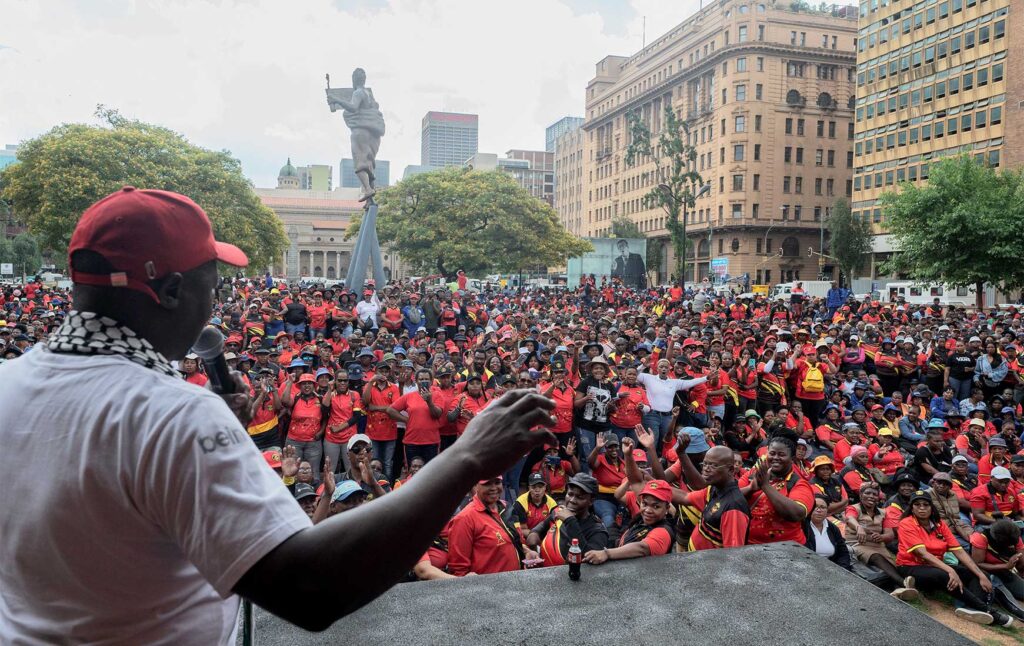Professionalising public service in South Africa’s municipalities
Local government fulfils an essential developmental function as the site of direct interface with government and service delivery for citizens. Yet, while pockets of excellence exist, many of South Africa’s municipalities are in a poor state, characterised by governance lapses. Public discourse is replete with stories about politicking and instability in councils. The inability of poorly politically appointed leadership is but one of the challenges, and can be attributed to both single-party dominance on some fronts and unstable coalition governments by multiple parties in other instances, and the perverse corruption wrought by the political leadership in both.
Yet, there is a crucial divide between political decision-making and the independence of administration by public servants in municipalities, and that is only one side of the politico-administrative divide. The local government sector also has deep-seated problems due to a lack of professionalism and poor management at an administrative level by unskilled career public servants. This has many consequences, including a lack of accountability, fueling community scepticism, disillusionment, and anger, and leading to the eruption of often violent protests that cause human casualties, the destruction of private property and damage to public infrastructure. The result is the flight of businesses and a loss of investment and economic opportunities, setting development gains back within communities.

Professionalism includes two core dimensions. The first is skills and experience or competence in the given area, and the second is the values, ethics and norms as a way of practice that help bind members of the profession, occupation, or organisation to a common mission.
There are a multitude of challenges in applying a blanket approach to “professionalism” within the public sector. After all, the country has over 1.2 million public servants who work in its administration at different levels, ranging from teachers and nurses to police and others whose main job is to contribute to public welfare overall. This article focuses on local government and how it provides both technical and administrative services.
Local government is a complex environment with demands that include financial resources management, implementation of technical deliverables, and the balancing of complex legislative requirements. At the forefront of debates about the functioning of local government should be the question of whether municipalities have the administrative capacity to fulfil their responsibilities and what role administrators play in ensuring financial and technical management and administering service provision. In South Africa, the clear vacuum left by this question highlights the need for far-reaching public service reforms targeted at promoting high professional standards at the frontlines to build a capable local government workforce.

Professionalism is associated with a system that serves the population according to an ethos of competence and merit as opposed to narrow interests. Since the inception of South Africa’s democratic dispensation, the professionalisation of the public service has been recognised as an important objective. Pieces of legislative frameworks that speak to professionalisation include the Constitution, the National Development Plan, the Municipal Systems and Structures Act, and the Public Administration Management Act, which make prescriptions within local government. However, this professionalisation has remained an elusive goal, and in 2022, the South African government renewed the focus by approving the long-awaited National Framework towards Professionalisation of the Public Sector, which aims to ensure a “responsive, meritocratic, and professional public administration in the service of the people” and sets out a series of fundamental public sector reforms.
The framework provides an approach to building human capital throughout the public sector and is based on five pillars of intervention.
- Pre-entry, reviewing recruitment and selection mechanisms.
- Introducing induction and onboarding practices.
- Improving planning and performance management tools.
- Improving training policies, continuous learning and professional development.
- Reviewing talent management practices in the public service.
However, efforts to professionalise the public sector face several challenges. Municipal departments have a high rate of vacancies, struggling to fill important administrative posts. The problem is evident in Gauteng province, South Africa’s economic hub, and most populous region. There vacancies span across every level, including that of municipal manager (for which in 2020, four of 11 positions were vacant). In the City of Johannesburg, there is a 42% vacancy rate, in Sedibeng a 50% vacancy rate, Lesedi and West Rand a 33% vacancy rate, and Merafong stands at 42%. As a second example, in the Free State Province, there is a 57% vacancy rate: of the total number of 129 senior posts required at municipalities, 73 are vacant. And only eight of the 23 municipalities have a qualified permanent municipal manager.

There is also a shortage of technical skills in financial reporting. The latest Auditor General’s report on local government audit outcomes highlights the grim picture, especially regressions in accountability in public procurement. Over the past year, material irregularities amounting to approximately R51.9 billion were identified. There was also an increase in instances of localised corruption, theft, fraud and malfeasance by municipal officials responsible for managing public funds. Granted, adverse findings by the Auditor General don’t always mean corruption. At times, there is an overemphasis on achieving clean audit outcomes at the expense of prioritising public service delivery objectives.
Also, many municipalities rely on consultants to prepare financial statements and often outsource work to consultants, professional services, and private contractors. The Auditor General reported that local government forked out consultant fees amounting to R1.6 billion or 13% of the R12.3 billion total financial reporting cost for the 2021-2022 period. Moreover, according to Stats SA, local government spent R39 billion on contracted services in the 2022 financial year.
Another challenge to professionalisation efforts is non-meritocratic appointments, nepotism and pervasive political intervention; the appointment of staff who simply lack adequate qualifications and do not meet the relevant minimum requirements for their roles due to limited experience. For instance, an estimated 1,200 senior managers are reported to lack the required qualifications for their roles. A significant part of this problem stems from the influence of political officials in the appointment process and broader administration and appointment of individuals who do not meet the minimum job requirements, compromising professionalism and effectiveness. Worryingly, the trend is not exclusive to areas governed by the ruling African National Congress. It has evolved even in places governed by multiparty coalitions, with the City of Johannesburg currently a potent case in point.
Low staff morale also leads to a lack of staff retention and high turnover. At present, the organisational culture does not provide a conducive environment for employees to serve. Interactions with the public have become more toxic and risky, leading to the threat of intimidation, violence and loss of life. This results in staff being unable to focus on their work and a clear deterrent to willingness to perform.

Protesters stand at a burning barricade in the Kliptown section of Soweto during a service delivery demonstration on July 27, 2016, ahead of the municipal elections. Photo by MARCO LONGARI / AFP
So, what is to be done to build a professional local civil service:
- Retaining talent and managing performance: municipalities are in dire need of highly technical expertise such as engineers, planners, surveyors and financial administrators, all of which are lucrative careers found in the private sector. This leads the most skilled people to be less inclined to go to places that require the most help such as rural and underdeveloped areas and townships. Instead of struggling to pay staff salaries and providing employment benefits, municipalities need to adequately incentivise people for their skills, build solid institutional cultures and adopt best practices for talent development of those holding municipal positions.
- Managing political overreach: more emphasis should be placed on mandatory in-service training and competency testing for would-be senior managers, as well as pre-employment competency assessments for individuals being recruited into senior management. This will go a long way in remedying non-meritocratic appointments and mitigating unfettered political influence.
- The development of a clear set of norms and standards: this can be achieved through improved collaboration with professional bodies operating within the various disciplines, including engineering, planning, auditing and property valuation. There must be active attempts to create tailored training programmes and ensure continuous learning and development with organs like the National School of Government and institutions of higher learning.
- The adoption of whole-of-society approaches and collaboration: the responsibility for professionalising local government and achieving Integrated Development Planning objectives lies with elected public representatives, executive officers, oversight and accountability bodies, and citizens themselves. Allowing for forward-thinking, knowledge and technological proficiencies will modernise administration, management and systems; and bolster institutional innovation, planning and implementation in response to current challenges.

Stuart is an independent policy analyst. He holds a Master of Arts degree in Security and Strategic Studies from the University of Pretoria. Previously, he was a researcher in the governance delivery and impact programme at Good Governance Africa. Before joining Good Governance Africa, he was a junior research fellow with the Centre for Law and Society at the University of Cape Town. He also worked as a research consultant at the Institute of Security Studies.



